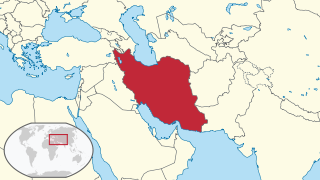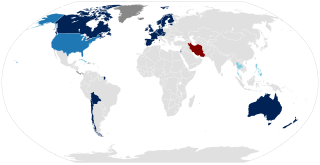The legal status of transgender people varies greatly around the world. Some countries have enacted laws protecting the rights of transgender individuals, but others have criminalized their gender identity or expression. In many cases, transgender individuals face discrimination in employment, housing, healthcare, and other areas of life.
Gender dysphoria (GD) is the distress a person experiences due to a mismatch between their gender identity—their personal sense of their own gender—and their sex assigned at birth. The term replaced the previous diagnostic label of gender identity disorder (GID) in 2013 with the release of the diagnostic manual DSM-5. The condition was renamed to remove the stigma associated with the term disorder.
Gender-affirming surgery is a surgical procedure, or series of procedures, that alters a person's physical appearance and sexual characteristics to resemble those associated with their identified gender. The phrase is most often associated with transgender health care and intersex medical interventions, however many such treatments are also pursued by cisgender and non-intersex individuals. It is also known as sex reassignment surgery, gender confirmation surgery, and several other names.
Gender identity is the personal sense of one's own gender. Gender identity can correlate with a person's assigned sex or can differ from it. In most individuals, the various biological determinants of sex are congruent, and consistent with the individual's gender identity. Gender expression typically reflects a person's gender identity, but this is not always the case. While a person may express behaviors, attitudes, and appearances consistent with a particular gender role, such expression may not necessarily reflect their gender identity. The term gender identity was coined by psychiatry professor Robert J. Stoller in 1964 and popularized by the controversial psychologist John Money.
The Standards of Care for the Health of Transgender and Gender Diverse People (SOC) is an international clinical protocol by the World Professional Association for Transgender Health (WPATH) outlining the recommended assessment and treatment for transgender and gender-diverse individuals across the lifespan including social, hormonal, or surgical transition. It often influences clinicians' decisions regarding patients' treatment. While other standards, protocols, and guidelines exist – especially outside the United States – the WPATH SOC is the most widespread protocol used by professionals working with transgender or gender-variant people.
The following outline is provided as an overview of and topical guide to transgender topics.

A trans man is a man who was assigned female at birth. Trans men have a male gender identity, and many trans men choose to undergo surgical or hormonal transition, or both, to alter their appearance in a way that aligns with their gender identity or alleviates gender dysphoria.
Russell Reid is a retired consultant psychiatrist who specialized in sexual and gender-related conditions. He is particularly known for his work with gender identity disorder patients. Richard Curtis took over his practice after his retirement. Reid grew up in New Zealand and worked privately in the United Kingdom. Britain's best-known expert on gender reassignment, he was a member of the parliamentary forum on transsexualism.
The history and subculture surrounding transgender people in Singapore is substantial. As with LGBT rights in the country in general, transgender rights in Singapore have also evolved significantly over time, including various laws and public attitudes in regards to identity documents, as well as anti-discrimination measures used by or pertaining to transgender people, in the areas of employment, education, housing and social services, amongst others.

Transgender rights in Iran are limited, with a narrow degree of official recognition of transgender identities by the government, but with trans individuals facing very high levels of discrimination, from the law, the state, and from the wider society.
Michelle Lynne Kosilek is an American convicted murderer. Kosilek was convicted of the 1990 murder of wife Cheryl McCaul and sentenced to life in prison. While incarcerated, Kosilek has become controversially known for repeatedly suing the Massachusetts Department of Correction (MDOC) for not providing medical treatment for her gender dysphoria in the form of vaginoplasty.

A transgender person is someone whose gender identity differs from that typically associated with the sex they were assigned at birth. Some transgender people who desire medical assistance to transition from one sex to another identify as transsexual. Transgender is an umbrella term; in addition to including people whose gender identity is the opposite of their assigned sex, it may also include people who are non-binary or genderqueer. Other definitions of transgender also include people who belong to a third gender, or else conceptualize transgender people as a third gender. The term transgender may be defined very broadly to include cross-dressers.

Lesbian, gay, bisexual, transgender and queer (LGBTQ) people face difficulties in prison such as increased vulnerability to sexual assault, other kinds of violence, and trouble accessing necessary medical care. While much of the available data on LGBTQ inmates comes from the United States, Amnesty International maintains records of known incidents internationally in which LGBTQ prisoners and those perceived to be lesbian, gay, bisexual or transgender have suffered torture, ill-treatment and violence at the hands of fellow inmates as well as prison officials.

Transsexual people experience a gender identity that is inconsistent with their assigned sex, and desire to permanently transition to the sex or gender with which they identify, usually seeking medical assistance to help them align their body with their identified sex or gender.

W v Registrar of Marriages [2013] HKCFA 39; FACV 4/2012 is a landmark court case for LGBT rights in Hong Kong. In a 4:1 decision, the Court of Final Appeal gave transgender people the right to marry as their affirmed gender rather than their assigned gender at birth.
Transgender health care includes the prevention, diagnosis and treatment of physical and mental health conditions, as well as sex reassignment therapies, for transgender individuals. A major component of transgender health care is gender-affirming care, the medical aspect of gender transition. Questions implicated in transgender health care include gender variance, sex reassignment therapy, health risks, and access to healthcare for trans people in different countries around the world.

Not all armed forces have policies explicitly permitting LGBT personnel. Generally speaking, Western European militaries show a greater tendency toward inclusion of LGBT individuals. As of January 2021, 21 countries allow transgender military personnel to serve openly: Australia, Austria, Belgium, Bolivia, Brazil, Canada, Chile, Czechia, Denmark, Estonia, Finland, France, Germany, Ireland, Israel, the Netherlands, New Zealand, Norway, Spain, Sweden, and the United Kingdom. Cuba and Thailand reportedly allowed transgender service in a limited capacity. In 1974, the Netherlands was the first country to allow transgender military personnel. The United States has allowed transgender personnel to serve in the military under varying conditions since President Joe Biden signed an executive order that allowed them to do so.
P v S and Cornwall County Council was a landmark case of the European Court of Justice (ECJ) which extended the scope of sex equality to discrimination against transsexuals.
Transgender rights in Australia have legal protection under federal and state/territory laws, but the requirements for gender recognition vary depending on the jurisdiction. For example, birth certificates, recognised details certificates, and driver licences are regulated by the states and territories, while Medicare and passports are matters for the Commonwealth.
This article addresses the legal and regulatory history of transgender and transsexual people in the United States including case law and governmental regulatory action affecting their legal status and privileges, at the federal, state, municipal, and local level, and including military justice as well.







